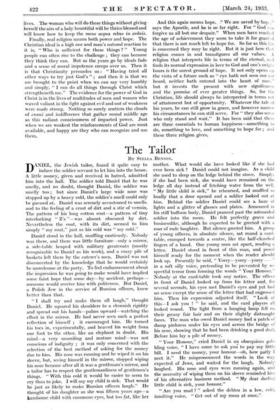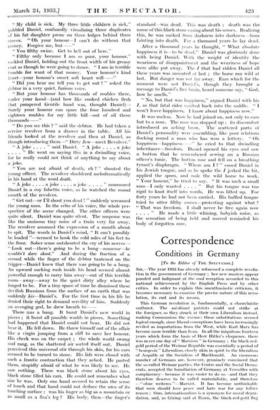The Tailor
BY STELLA BENSON.
DANIEL, the Jewish tailor, found it quite easy to induce the soldier servant to let him into the house. A little money, given and received in hatred, admitted him into the hall. The soldier told Daniel that he was smelly, and no doubt, thought Daniel, the soldier was smelly too ; but since Daniel's large wide nose was stopped up by a heavy cold, the soldier's smell could only be guessed at. Daniel was serenely accustomed to smells. and to the feeling of a crust of dirt and a stir of vermin, The pattern of his long cotton coat—a pattern of tiny interlocking "Z's "—was almost obscured by dirt. Nevertheless the coat, with its dirt, seemed to him simply "my coat," just as his cold was "my cold."
Daniel stood in the hall, snuffling cautiously. Nobody was there, and there was little furniture—only a mirror, a side-table heaped with military greatcoats (mostly recognizable to Daniel as his work), and a crazy pile of baskets left there by the caterer's men. Daniel was not disconcerted by the knowledge that he would certainly be unwelcome at the party. To feel embarrassment about the impression he was going to make would have implied some faint hope that some day—by accident, perhaps— someone would receive him with politeness. But Daniel, a Polish Jew in the service of Russian officers, knew better than that.
"I shall try and make them all laugh," thought Daniel. He squared his shoulders to a clownish rigidity and spread out his hands—palms upward—watching the effect in the mirror. He had never seen such a perfect reflection of himself ; it encouraged him. He turned his toes in, experimentally, and heaved his weight from one foot to the other, like an elephant in doubt. His mind—a very unsmiling and mature mind—was not conscious of indignity ; it was only concerned with the selection of the best method of asking for the money due to him. His nose was running and he wiped it on his sleeve, but, seeing himself in the mirror, stopped wiping his nose because after all it was a gentleman's mirror, and a tailor has to respect the gentlemanliness of gentlemen's things. "With this cold it would be easier to seem to cry than to joke. I will say my child is sick. That would be just as likely to make Russian officers laugh." He thought of his daughter as she was fifteen years ago—a handsome child with enormous eyes, but too fat, like her mother. What would she have looked like if she had ever been sick ? Daniel could not imagine. As a child she used to sleep on the ledge behind the stove. Simply, if she had been sick, she would have remained on the ledge all day instead of fetching water from the well. "My little child is sick," he rehearsed, and snuffled so loudly that a door opened and a soldier looked out at him. Behind the soldier Daniel could . see a haze of lights and a glitter of glasses and plates. Armoured in his stiff buffoon body,, Daniel pranced past the astounded soldier into the room. He felt perfectly grave and businesslike, although he expected to be greeted with a roar of rude laughter. But silence greeted him. A group of young .officers, in absolute . silence, sat round a card- table, cramped towards a centre, like the half-clenched fingers of a hand. One young man sat apart, reading a letter. Daniel stood in front of this man, and posed himself ready for the moment when the reader should look up. Presently he said, " Yorry7—yorry—yorry in a soft silly voice, pretending to be prevented by re- spectful terror from forming the words "Your Honour." Nobody at 'the card-table took any notice. The officer in front of Daniel looked up from his letter and, for several seconds, his eyes met Daniel's eyes and yet had no sense except the sense of the letter that had _engrossed him: Then his expression adjusted itself. "Look at this—I ask you ! " he said, and the card players all looked round. The light from a hanging lamp fell on their greasy fair hair and on their slightly distraught faces. The man who owed Daniel money had a patch of damp pinkness under his eyes and across the bridge of his nose, showing that he had been -drinking a good deal. Before him lay a pile of money.
"Your Honour," cried Daniel in an obsequious gob- bling voice, "I have come to ask you to pay my little bill.. I need the money, your honour—oh, how. patly I neet it." He mispronounced the words in the way expected of Jews, and waited for the laugh. ,Nobody laughed. His nose and eyes were running again, and the necessity of wiping them on his sleeve reminded him of his alternative business method. "My dear darling little. child is sick, your .honour."
"Are you mad ? " asked the debtor in a low, cold, insulting voice. "Get out of my room at once:" " My child is sick: My three little children is sick," gobbled Daniel, confusedly visualizing three duplicates of his fat- daughter prone on three ledges behind three stoves. 'Oh your honourI can't' do without that money. Forgive me, but • "You filthy swine. Get to hell out of here."
"Filthy only because I am so poor, your honour," cackled Daniel, holding out the front width of his greasy coat as though he were going to dance. " I am in terrible trouble for want of that money. - Your honour's kind heart—your honour's sweet soft heart "Did you hear me tell you to get out?" asked the debtor in a very quiet, furious voice.
"But your honour has thousands of roubles there, under your hand—(and how like cooked chicken flesh that pampered Gentile hand was, thought Daniel)— Surely your honour can spare the four . hundred and eighteen roubles for my little bill—out of all those thousands------" • "Do you see this ? " said the debtor. He had taken a service revolver from a drawer in the table. • All his friends looked at the revolver and then at Daniel, as though introducing thern—" Dirty Jew—meet Revolver."
"A joke . . . . " said Daniel. "A joke . . . . a joke . . . " He went on saying this in a dwindling voice, for he really could not think of anything to say about a joke.
"You are not afraid of death, eh ? " shouted the young officer. The revolver shuddered melodramatically in his' hand at the word death.
"A joke . . . . a joke . . . . a joke . . . . " murmured Daniel in a coy falsetto voice, as he watched the round mouth of the revolver.
"Get out—or I'll shoot you dead ! " suddenly screamed the young. man. In the echo of his voice, the whole per- spective of the scene changed. The other officers were quite silent. Daniel was quite silent. The suspense was like the ominous tiny noise of a train very far away. The revolver assumed the expression of a mouth about to spit. The words in Daniel's mind, " It can't possibly be loaded "—seemed to hook the cold soles of his feet to the floor. Sober sense outshouted the cry of his nerves- " Look out—there's going to be a bang—nonsense—he wouldn't dare shoot." And during the fraction of a second while the finger of the debtor tautened on the trigger—Daniel knew that there was going to be a bang. An upward sucking rush inside his head seemed almost powerful enough to carry him away—out of this terrible room—away—away to the quiet dirty alley where he longed to be. For a tiny space of time he dismissed these devilish Russians from the surface of an earth that was suddenly his—Daniel's. For the first time in his life he denied their right to demand servility of him. Suddenly an avenging god, he drew breath to— There thas a bang. It burst Daniel's new world in Pieces ; it burst all possible worlds in pieces. Something had happened that Daniel could not bear. He did not bear it. He fell down. He threw himself out of the affair like a virgin jumping from a cliff to save her honour. His cheek was on the carpet ; the whole world swung and rang, as the shattered air sorted itself out. Daniel -perceived this universal stir through his skin, for his cars seemed to be turned to stone. His lids were closed with . such a frantic contraction that they ached. He parted them, stupidly afraid of what he was likely to see. He saw nothing. There was black stone about his eyes, black stone filled his ears. He could. not remember what size he was. Only one hand seemed, to retain the sense of touch and that hand could not deduce the area of its touching surface ; was his finger as big as a mountain or as small as a flea's leg ? His body, then—the finger's standard—was dead. This Was death ; death was the name ofthis black stone casing about his senses. Realizing this, he was sucked from darkness into darkness—from fainting into death. For a thousand years he lay dead.
After a thousand years he thought, " What absolute happiness it is—to be dead." Daniel was gloriously done with being Daniel. With the weight of identity the -weariness of disappointment and the weariness of hope were alike put away. The / that had ridden Daniel all these years was unseated at last ; the horse ran wild at last. But danger was not far away. Ears which for the 'moment were not Daniel's, though they brought a message to Daniel's free brain, heard someone say, " God, how he smells."
" No, but that was happiness," argued Daniel with his /, as that fatal rider vaulted back into the saddle. " I -Won't leave happiness. I know about happiness now."
It was useless. Now he had joined on, not only to ears but to a nose. The' nose was stopped up ; its discomfort 'introduced an. aching brow. The scattered parts of Daniel's personality were assembling, like poor relations flocking round a man who has won a lottery. " Oh happiness—happiness " he cried to that dwindling inheritance—freedom. Daniel opened his eyes and saw a button that he remembered sewing on a Russian • officer's tunic. The button rose and fell on a breathing tyrant's diaphragm. "Where am I ? " cooed Daniel in his Jewish tongue, and as he spoke the I jerked the bit, applied the spurs, and rode the wild horse to work. " Your honour," he tried to say. " It was such a small sum—I only wanted . . . . " But his tongue was too rigid to knot itself into words. He was lifted up. For forty years he had not been carried. His baffled tongue tried to utter filthy curses—protesting against what ? "That was freedom. I shall never be free again now " He made a little whining, babyish noise, as the sensation of being held and moved reminded his body of forgotten ease.







































 Previous page
Previous page